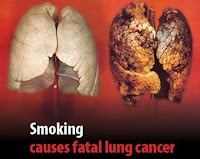 One billion people will die from tobacco-related causes by the end of the century if current consumption trends continue, according to a global report released by the World Health Organization (WHO).
One billion people will die from tobacco-related causes by the end of the century if current consumption trends continue, according to a global report released by the World Health Organization (WHO).At a press conference held in midtown
The 369-page WHO Report on the Global Tobacco Epidemic, 2008, bound like a high school yearbook and bundled with a "cigarette pack" of colored markers, called on governments to adhere to six tobacco control policies it calls MPOWER: monitor tobacco use; protect people from secondhand smoke; offer help to people who want to quit; warn about the risks of smoking; enforce bans on cigarette advertising; and raise tobacco taxes. The report also breaks down tobacco consumption and prevention efforts country by country. To date, it is the most comprehensive study of its kind at a global level, said
The collected data should equip countries around the world to begin implementing anti-tobacco policies, Chan says, including smoking bans, aggressive anti-tobacco campaigns and massive tobacco tax hikes. According to the report, nearly two thirds of the world's smokers live in 10 countries - China, India, Japan, Indonesia, Bangladesh, the U.S., Brazil, Germany, Russia, and Turkey.
According to the study, the most effective tactic globally has been simply to raise prices. Lower income people smoke significantly more than the wealthy, and spend a much higher proportion of their income on tobacco - 20% of the most impoverished households in
Another vulnerable group: women. Though women still smoke at just one quarter the rate of men, tobacco advertisers are increasingly targeting this largely untapped market. Among adolescents in European Union member nations, girls may now be even more likely to smoke than boys. Globally, Chan said, "the rise of tobacco use among girls and young women is among the most ominous trends."
As with virtually all public-health problems, a major hurdle to reducing smoking, the study said, is lack of public education. People are not fully aware of the hazards of smoking, and it's a weakness that the tobacco industry is quick to exploit, Bettcher said.
Asked whether he would back a federal ban on smoking in the workplace or public spaces, Bloomberg said he would, but added, "I don't think the federal government should prohibit the manufacture or sale of cigarettes," but that combatting tobacco should mean diminishing the demand.
Once a smoker himself, Bloomberg said he was able to quit only when he truly understood the consequences. "As I became more mature and started thinking, 'Do I want to live or not?' it was an easy decision." For those who want to smoke, however, he feels it should be their right, so long as they aren't harming others. "I happen to agree with those who think you have a right to kill yourself," he said.













0 comments :
Post a Comment